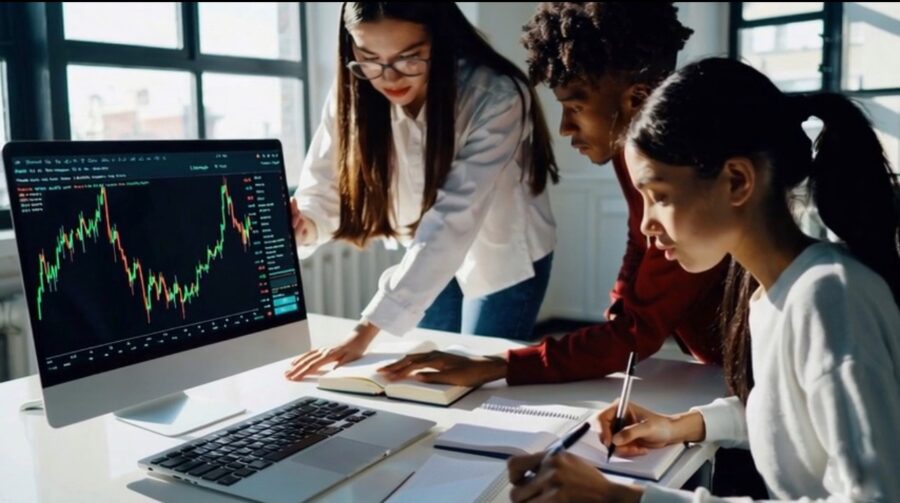Have you ever wondered how a single geopolitical event can ripple through global markets? Consider this: when the United States imposes sanctions on a major oil-exporting nation, the impact is far-reaching. Crude oil prices fluctuate, energy companies brace for change, and global markets adjust to a new status quo.
 Understanding these connections is part of the International Political Economy (IPE) and Energy Security Policy courses in our Political Science Department, taught by Dr. Wojtek Wolfe. This year, we’ve added Trading View, a charting software, to help students visualize the immediate and long-term effects of geopolitical decisions on markets. Using Trading View, students dig into real-time data to uncover the impact of policies such as trade tariffs, sanctions, and geopolitical events. By analyzing commodity prices (for example, the price of gold), stock trends, and broader market movements, they see firsthand how political decisions can drive short- and long-term market changes. Last year, the Energy Security Policy course students examined how sanctions on Russian energy products impacted commodity prices and supply chains. They also learned how OPEC announcements and market projection reports affect crude oil prices. By examining trading volumes, price trends, and quantitative indicators, students can see the direct impact of policy decisions. These tools helped to make the course readings and lectures come to life in the real world. In this semester’s IPE course, students will use this software in assignments designed to connect broad geopolitical and economic events with real-world market data. Students will examine how the Russia-Ukraine conflict continues to affect global wheat markets and how US-China trade tensions interplay between policy and business, translating into equity and commodity pricing.
Understanding these connections is part of the International Political Economy (IPE) and Energy Security Policy courses in our Political Science Department, taught by Dr. Wojtek Wolfe. This year, we’ve added Trading View, a charting software, to help students visualize the immediate and long-term effects of geopolitical decisions on markets. Using Trading View, students dig into real-time data to uncover the impact of policies such as trade tariffs, sanctions, and geopolitical events. By analyzing commodity prices (for example, the price of gold), stock trends, and broader market movements, they see firsthand how political decisions can drive short- and long-term market changes. Last year, the Energy Security Policy course students examined how sanctions on Russian energy products impacted commodity prices and supply chains. They also learned how OPEC announcements and market projection reports affect crude oil prices. By examining trading volumes, price trends, and quantitative indicators, students can see the direct impact of policy decisions. These tools helped to make the course readings and lectures come to life in the real world. In this semester’s IPE course, students will use this software in assignments designed to connect broad geopolitical and economic events with real-world market data. Students will examine how the Russia-Ukraine conflict continues to affect global wheat markets and how US-China trade tensions interplay between policy and business, translating into equity and commodity pricing.

Integrating Trading View into the IPE curriculum equips students with skills that extend beyond the classroom. By working with real-world data, students gain expertise in interpreting market trends and identifying patterns using moving averages, trendlines, and custom indicators. This analytical confidence invites them to explore various careers related to financial analysis and policy advising. Connecting political developments with market outcomes gives students a unique edge in understanding global economic systems. Students leave the course equipped to answer questions like:
- How do trade relations between the US and China impact US tech stocks?
- What happens to global commodity prices during a natural disaster or armed conflict?
- How can policymakers prepare for the economic shifts coming from sanctions and tariffs?
Think tank professionals, government agencies, and the private sector tackle complex challenges, including economic events, public health crises, environmental issues, and national security-oriented changes. Their work demands strategic thinking, innovative problem-solving, and adaptability to rapidly changing political, technological, and social landscapes.
Critical thinking, strong communication skills, and a deep understanding of current events and policy frameworks are essential for students aspiring to these fields. Our courses include opportunities for relevant internships and research projects that provide valuable insights into how these organizations operate and address global issues. By developing these skills and gaining hands-on experience with new software, students can position themselves to make meaningful contributions to society, confidently addressing the pressing challenges of our time. Trading View helps to make these learning goals more approachable through its real-time data feed, charting tools, and extensive quantitative indicators.
